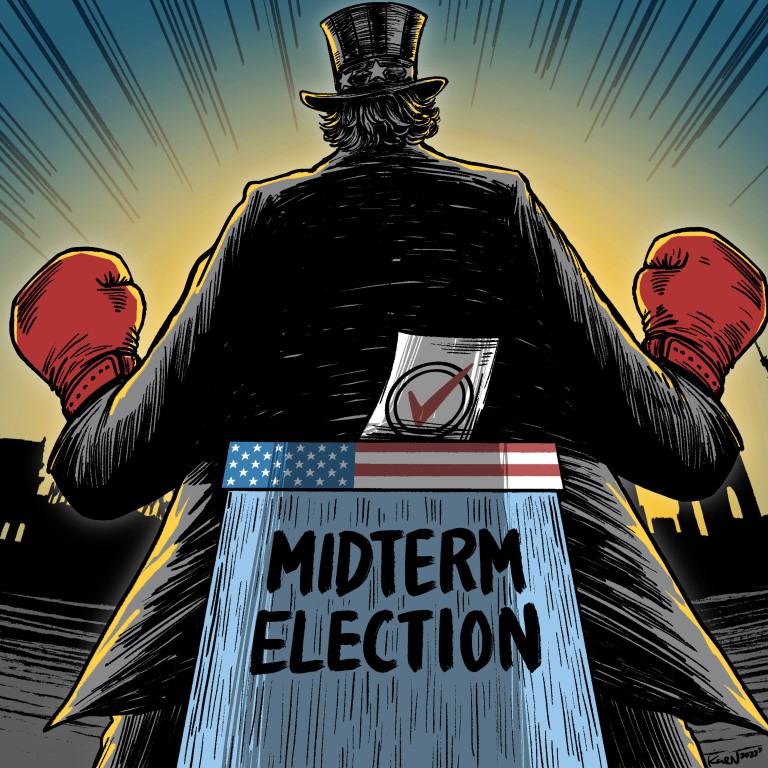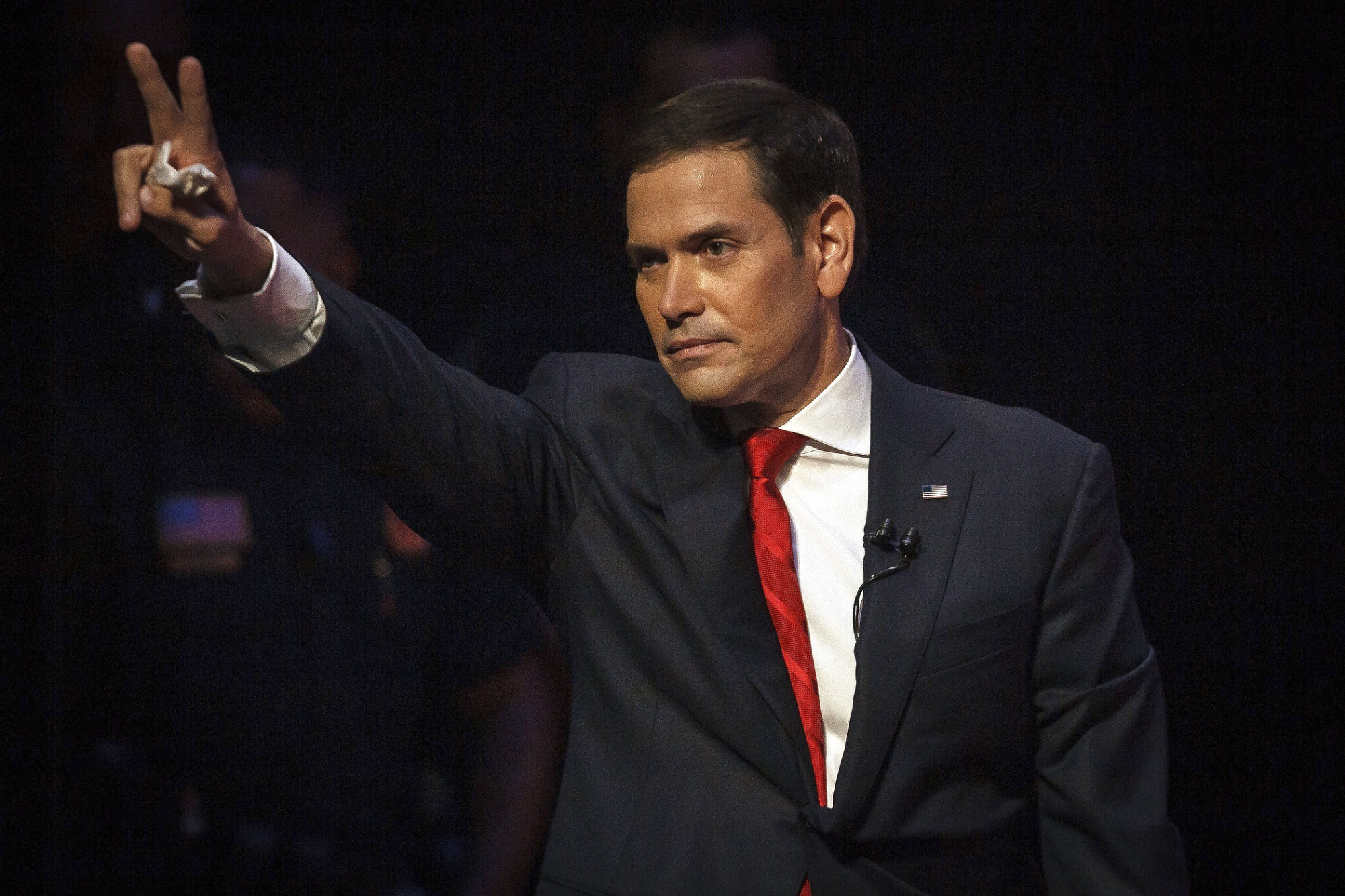
US’ hard-line policy on China likely to hold whoever wins midterm elections, say analysts
- House victory by Republicans likely to pressure Biden administration to adopt a ‘more aggressive’ stance as Beijing’s most vocal critics gain more control
- Both parties converge broadly on economic competition and human rights while Republicans focus more on ideological competition and coronavirus accountability
Recent polls suggest that next month’s elections – taking place as Americans’ views of China have plunged to historically low levels – are likely to result in a Republican-led House of Representatives and possibly a Republican Senate. The Democratic Party currently has control over both legislative chambers, with razor-thin margins in each.
US congressional elections are held every two years, when all House seats are up for grabs along with a third of Senate seats.
While this year features several competitive races and notable retirements, many leading voices on China policy, including Senator Marco Rubio, Republican of Florida, appear to be a lock for re-election.

The continuing presence of these lawmakers would reinforce what most observers have described as a bipartisan consensus on China.
“2022 is an excellent example of the tremendous hardening of the overall American position in dealing with China,” Sutter said.
Of the introduced bills, more than 120 secured bipartisan cosponsorship, according to GovTrack, a Washington-based website that tracks Congressional activity.
Observing the electoral races, Jack Zhang of the University of Kansas and director of its Trade War Lab noted that China had become “such a bipartisan issue that candidates are commenting on it regardless of their background or expertise” in the country.
“China is the Swiss Army knife issue for Congress,” Zhang said.
However, within the overall toughening attitude towards China, Republicans and Democrats differ on some points, he said, explaining that “there’s not so much a bipartisan consensus as a bipartisan convergence”.
Blinken: US must not ‘lose sight of cooperative aspect’ of China relationship
And while both parties have escalated their rhetoric on China, including on the campaign trail, Republicans have been more vocal compared with Democrats.
Information compiled in 2019 and 2020 by the University of California San Diego’s China Data Lab, for instance, revealed that Republicans tweeted considerably more often about China than did Democrats.
Republicans have also been more active in sponsoring China-related legislation, introducing over twice as many bills as Democrats in the current congressional term.
Anna Ashton of the Eurasia Group, a political consulting firm, said a House victory by Republicans would translate into “a much louder, much more aggressive push for more tough-on-China policies” in the chamber. Democrats, meanwhile, could face a perception challenge if they retain the Senate as they fear looking weak on China, she added.
As for Congress and the president, the two branches routinely stake out divergent policy positions. But Sutter, who previously worked at the US National Intelligence Council and the Senate Foreign Relations Committee, noted the relationship between the branches recently had been more cooperative than contentious.
“2022 has been a banner year in Congress passing legislation and taking action that is very much in line with what the Biden administration wants,” said Sutter.
The “Commitment to America” – a statement of policy intentions that House Minority Leader Kevin McCarthy said would form the core of the chamber’s agenda should the Republicans take over after the midterms – contains a call to “strengthen the supply chain and end dependence on China”.
Chinese local governments ramp up chip industry support as US piles on pressure
Released in September, the commitment also calls for the establishment of a select committee on China to defend US national security.
But if Republicans gain control of the House, which Sutter said operates with “more friction” than the Senate, “attacks on the Biden administration for being soft on this or soft on that vis-à-vis China could ensue”.
“The Senate is a more collaborative body than the House,” he explained. “A lot of the Republicans have been at this a long time and they work with the Democrats.”
Despite Biden following through with his commitment to the China challenge, “some Republicans could choose to advocate for unrealistically aggressive policies, banking on looking tougher than Democrats because the Biden administration will want to avoid outright brinkmanship,” Ashton said.
US talks of teaming up with China, but analysts remain pessimistic about ties
To override a presidential veto, Republicans would need a two-thirds majority in both legislative chambers – a prospect polls indicate is unlikely to materialise. Short of holding a vetoproof majority in Congress, Republicans would only be able to urge the Biden administration to stand firm in its China policy, rather than dictate it.
Meanwhile, China hawks in Congress appear poised to return in the next session and keep heaping on the pressure.
Rubio, a long-time critic of China and senior member of the Senate Foreign Relations Committee, had a 93 per cent chance at winning re-election as of last week, according to FiveThirtyEight, a US website that analyses polling data.
This congressional term alone, Rubio sponsored at least 28 pieces of China-related legislation.
Other Senate races involving incumbents active on China policy include Chris Van Hollen, Democrat of Maryland, and Todd Young, Republican of Indiana. Both are favoured to win, according to FiveThirtyEight’s latest projections.

Still other outspoken senators on China like John Cornyn, Republican of Texas; Tom Cotton, Republican of Arkansas; and Rick Scott, Republican of Florida, are not up for re-election.
In the Senate, two hotly contested races that might affect China policy are Ohio’s election between Democrat Tim Ryan and Republican JD Vance, and Pennsylvania’s pitting Democrat John Fetterman against Republican Mehmet Oz.
Both campaigns have been marked by extensive China-bashing and candidates’ accusations about one another’s ties to the country. Vance in particular has expressed support for maintaining existing tariffs and imposing new ones.
These races could prove significant because the winners would succeed lame-duck incumbents Rob Portman and Pat Toomey, both regarded as moderate on trade, according to Rory Murphy of the US-China Business Council.
In addition, influential House incumbents like Jim Banks, Republican of Indiana, and Michael McCaul, Republican of Texas, seem primed for re-election.
Apart from underscoring national security and supply-chain concerns, the report emphasised ideological and technological competition with China.
Initially conceived as a bipartisan effort, the task force failed to garner Democratic support. Its report is considered a likely blueprint for Republican strategy on China.
Washington’s consensus on China rarely unites US lawmakers, research finds
If Republicans take control of the House, McCaul as the current top Republican on the House Foreign Affairs Committee would assume leadership of the panel, which exercises jurisdiction over bills and investigations related to foreign affairs.
Banks served on the China task force and chairs the Republican Study Committee, the largest conservative caucus in the House. In 2021, the caucus introduced alternative legislation to a bill that led to the Chips and Science Act.
Amid the jockeying for clout, the pointed anti-China rhetoric that has lately become a staple of American election campaigns can yield legislative consequences.
Research by Jessica Chen Weiss and Amber Wichowsky drawing upon data from the 2010 midterms found that challengers who politically attacked China were more likely to co-sponsor China-related legislation. Incumbents who were criticised for being weak on China took tougher positions on the country after their re-election.
Unofficial US-China dialogue: seeing worst in each other undermines relations
The encouragement of a more confrontational stance towards China ultimately highlights structural tensions between the two countries that no single election will change.
Recent polling data from Pew Research Centre showed that this year the number of Americans holding a negative view of China had reached a historic high of 82 per cent, up 6 per cent from 2021 and a whopping 35 per cent from 2017.
“The relationship is bad, and will continue to worsen, not because this or that American politician or party is ascendant, but because oceanic forces are driving the two nations towards profound distrust,” said Robert Daly of the Wilson Centre’s Kissinger Institute on China and the United States.
“Neither country has the wisdom or will to stem the tide,” Daly said. “One or, more likely, both will have to undergo difficult changes that result in new conceptions of nation and strategy before the tension breaks.”

